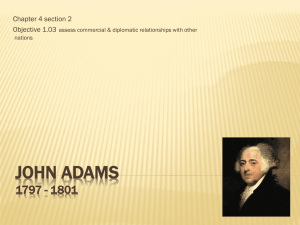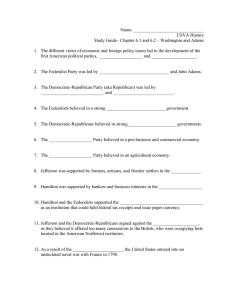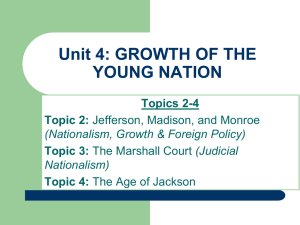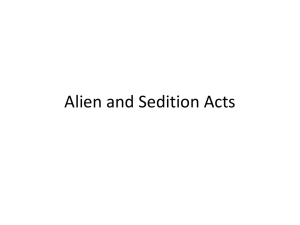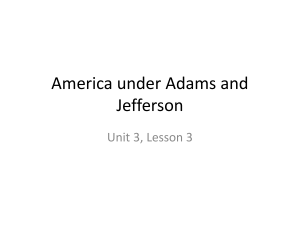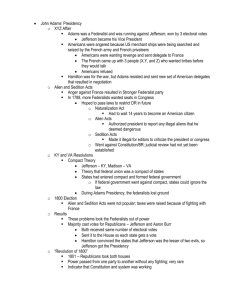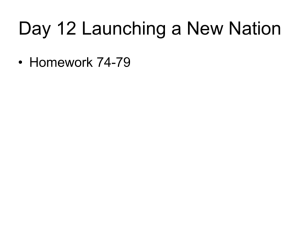PrepUS History Name: ____________________ Date: _______________
advertisement
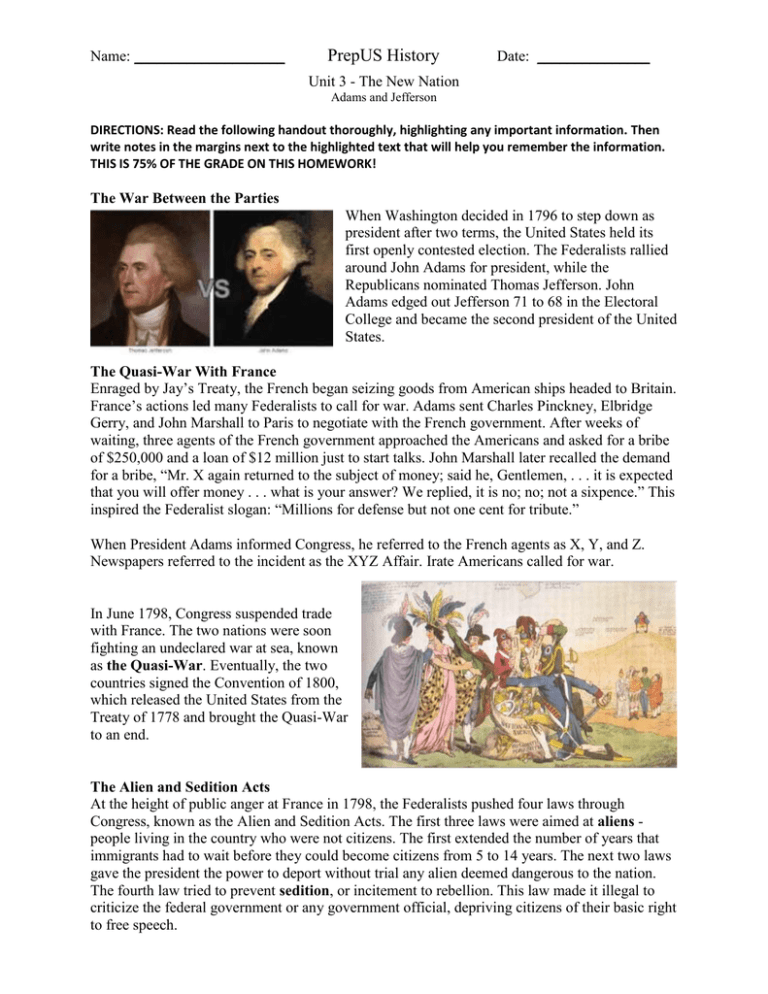
Name: ____________________ PrepUS History Date: _______________ Unit 3 - The New Nation Adams and Jefferson DIRECTIONS: Read the following handout thoroughly, highlighting any important information. Then write notes in the margins next to the highlighted text that will help you remember the information. THIS IS 75% OF THE GRADE ON THIS HOMEWORK! The War Between the Parties When Washington decided in 1796 to step down as president after two terms, the United States held its first openly contested election. The Federalists rallied around John Adams for president, while the Republicans nominated Thomas Jefferson. John Adams edged out Jefferson 71 to 68 in the Electoral College and became the second president of the United States. The Quasi-War With France Enraged by Jay’s Treaty, the French began seizing goods from American ships headed to Britain. France’s actions led many Federalists to call for war. Adams sent Charles Pinckney, Elbridge Gerry, and John Marshall to Paris to negotiate with the French government. After weeks of waiting, three agents of the French government approached the Americans and asked for a bribe of $250,000 and a loan of $12 million just to start talks. John Marshall later recalled the demand for a bribe, “Mr. X again returned to the subject of money; said he, Gentlemen, . . . it is expected that you will offer money . . . what is your answer? We replied, it is no; no; not a sixpence.” This inspired the Federalist slogan: “Millions for defense but not one cent for tribute.” When President Adams informed Congress, he referred to the French agents as X, Y, and Z. Newspapers referred to the incident as the XYZ Affair. Irate Americans called for war. In June 1798, Congress suspended trade with France. The two nations were soon fighting an undeclared war at sea, known as the Quasi-War. Eventually, the two countries signed the Convention of 1800, which released the United States from the Treaty of 1778 and brought the Quasi-War to an end. The Alien and Sedition Acts At the height of public anger at France in 1798, the Federalists pushed four laws through Congress, known as the Alien and Sedition Acts. The first three laws were aimed at aliens people living in the country who were not citizens. The first extended the number of years that immigrants had to wait before they could become citizens from 5 to 14 years. The next two laws gave the president the power to deport without trial any alien deemed dangerous to the nation. The fourth law tried to prevent sedition, or incitement to rebellion. This law made it illegal to criticize the federal government or any government official, depriving citizens of their basic right to free speech. In 1798 and 1799, the Republican-controlled legislatures of Kentucky and Virginia passed resolutions, anonymously written by Jefferson and Madison, that criticized the Alien and Sedition Acts. The Virginia Resolutions introduced the theory of interposition. They argued that if the federal government did something unconstitutional, the state could interpose between the federal government and the people and stop the illegal action. The Kentucky Resolutions advanced the theory of nullification. According to this theory, if the federal government passed an unconstitutional law, the states had the right to nullify the law, or declare it invalid. The Election of 1800 John Adams faced a tough battle for reelection in 1800. The Alien and Sedition Acts had angered many people, as had new taxes on houses, land, and enslaved people. The Republican nominees, Thomas Jefferson for president and Aaron Burr for vice president, opposed the taxes and the national bank. The election revealed a flaw in the system for selecting the president. The Constitution does not let citizens choose presidents directly. Each state chooses electors - the same number as it has senators and representatives. This group, known as the Electoral College, then votes for the president. Under the original terms of the Constitution, each elector in the Electoral College voted for two people, normally one for the presidential candidate and another for the vicepresidential candidate. To avoid a tie between Jefferson and Burr, the Republicans intended for one elector to refrain from voting for Burr, but when the votes were counted, Jefferson and Burr each had 73. Since no candidate had a majority, the Federalist-controlled House of Representatives had to choose the president. Many Federalists despised Jefferson, but Alexander Hamilton convinced his followers to support Jefferson (Hamilton didn’t like Burr). In February 1801, one Federalist cast a blank ballot so that Jefferson received more votes than Burr and became president. The election of 1800 was an important turning point in American history. At the time, the Federalists controlled the army, the presidency, and Congress. They could have refused to step down and overthrown the Constitution. Instead, they respected the people’s right to choose the president. The election of 1800 demonstrated that power in the United States could be peacefully transferred despite strong disagreements between the parties. Jefferson’s Administration Thomas Jefferson privately referred to his election as the “Revolution of 1800.” He believed that Washington and Adams had acted too much like royalty, and he tried to create a less formal style for the presidency. Despite these changes, he did not overturn all of the Federalists’ policies. Instead he sought to integrate Republican ideas into the policies that the Federalists had already put in place. A strong believer in small government, Jefferson hoped to limit federal power. He began paying off the federal debt, cut government spending, and did away with the hated whiskey tax. Instead of a standing army, he planned to rely on local militia. Jefferson chose Albert Gallatin to be secretary of the treasury. Gallatin, like Hamilton before him, worked to solidify the structure and procedures of the Department of the Treasury. 2 The Louisiana Purchase One of Jefferson’s strongest beliefs was that a republic could survive only if most of the people owned land. This led him to support the idea of expanding the country farther west. In 1800 French leader Napoleon Bonaparte convinced Spain to give Louisiana back to France in exchange for helping Spain take control of part of Italy. Napoleon’s deal worried Jefferson, because it gave France control of the lower Mississippi and the port of New Orleans. Jefferson ordered his ambassador to France to try to block the deal or gain concessions for the United States. By 1803, Napoleon had begun making plans to conquer Europe and was short on funds. He offered to sell all of the Louisiana Territory, as well as New Orleans, to the United States. The ambassador immediately accepted. On April 30, 1803, the United States bought Louisiana from France for $11.25 million. It also agreed to take on French debts of about $3.75 million owed to American citizens, making the total cost about $15 million. The Senate easily approved the Louisiana Purchase, which more than doubled the size of the United States and gave the nation control of the entire Mississippi River. Lewis and Clark Jefferson chose Meriwether Lewis and William Clark to lead an expedition into the Louisiana Territory to find a route to the Pacific Ocean. In May 1804, the “Corps of Discovery” headed west up the Missouri River. Along the way they met Sacagawea, a Shoshone woman who became their guide and interpreter. The expedition found a path through the Rocky Mountains and eventually traced the Columbia River to the Pacific Ocean. The expedition also gave the United States a claim to the Oregon Territory. The Pike Expedition In 1805 Zebulon Pike mapped much of the upper Mississippi River, and in 1806 he headed west to find the headwaters of the Arkansas River. He traveled to Colorado, where he charted the mountain now known as Pikes Peak. His account of this trip gave Americans their first detailed descriptions of the Great Plains and the Rocky Mountains. 3 Answer the following review questions: Why did the French began seizing goods from American ships headed to Britain? A. Jay’s Treaty stated that American merchants would not be discriminated against when they traded with Britain. B. the United States had most-favored nation trading status with Britain. C. France and England were at war. D. all of the above are true How did Federalists respond to the XYZ Affair with France? A. They encouraged a boycott of French goods. B. They urged John Adams to continue negotiations. C. They initiated the Convention of 1800. D. They demanded that the country go to war with France The French and American seizure of each other’s ships at sea became known as A. the Quasi-War. C. the Mr. X Affair. B. the French Invasion. D. the Naval Incursion. In response to the Alien and Sedition Acts, Virginia and Kentucky argued that A. states could disobey unconstitutional federal laws. B. all federal laws were subject to review by the federal judiciary. C. legislators had the right to override unconstitutional laws. D. immigrants in the South were exempt from the Alien and Sedition Acts. Under the theory of ______, states could declare a federal law invalid. A. federalism C. republicanism B. constitutionalism D. nullification Define interposition. ______________________________________________________________________________ ______________________________________________________________________________ ______________________________________________________________________________ ______________________________________________________________________________ Define nullification. ______________________________________________________________________________ ______________________________________________________________________________ ______________________________________________________________________________ ______________________________________________________________________________ What important lesson did the country learn because of the election of 1800? A. Power could be peacefully transferred from one party to another. B. The House of Representatives was not able to cast fair votes for president. C. The Electoral College system was a perfect system of election. D. Democratic-Republicans were the majority in the United States 4 Once elected, how did Jefferson handle previous Federalist policies? A. He overturned Federalist laws and appointments. B. He appointed only people who agreed with his own ideas. C. He sought to integrate them into his presidency. D. He upheld them all and became a Federalist himself. The deal with France to acquire its possessions in North America was known as A. the Mississippi Bargain. C. the Napoleonic Treaty. B. the French Acquisition. D. the Louisiana Purchase. What was a result of the purchase of land from France? A. The size of the United States doubled. B. The United States went into recession over the debt. C. The United States entered a war with Britain. D. The United States became allies with Spain. Who was chosen to explore and map the newly acquired territory? A. Meriwether Lewis and William Clark C. Ebenezer Zane B. Kit Carson D. Zebulon Pike Who mapped much of the upper Mississippi River in 1805 and headed west to find the headwaters of the Arkansas River in 1806? A. Meriwether Lewis and William Clark C. Ebenezer Zane B. Kit Carson D. Zebulon Pike 5
